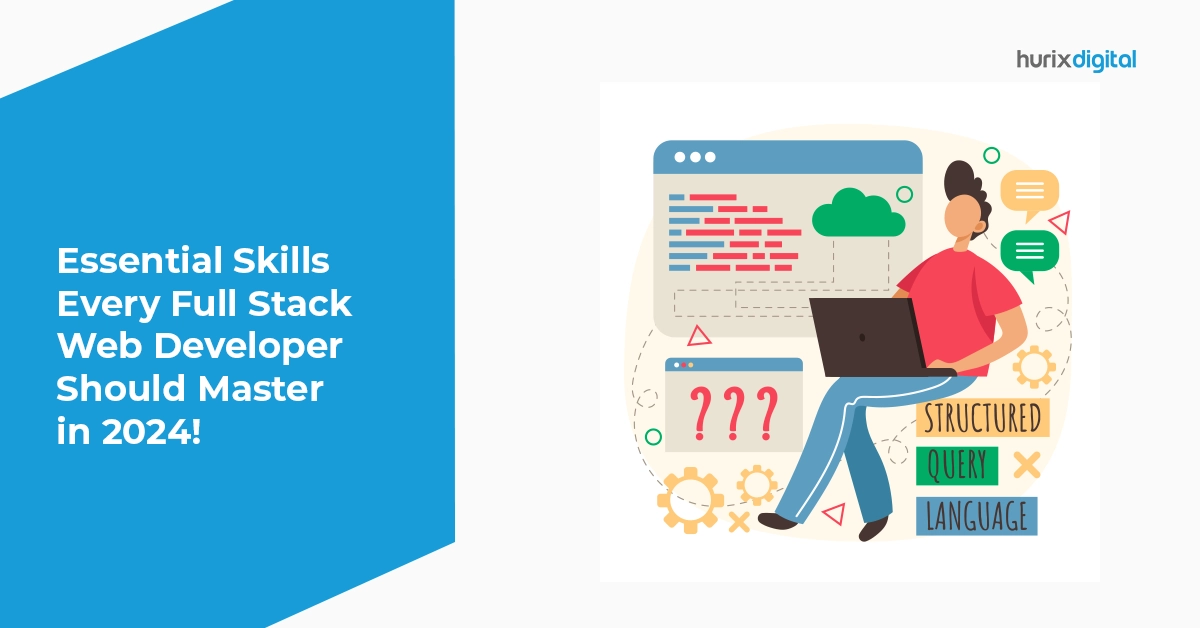Summary
This article delves into the crucial skills required for full-stack web developers in 2024. It covers UI/UX design, front-end and back-end coding, debugging, and testing. The piece forecasts an increased demand for these skills and highlights essential proficiencies such as HTML, CSS, JavaScript, Python, and various testing methodologies.
As the digital world expands, businesses increasingly rely on online platforms and virtual interactions to thrive. This growing trend fuels the demand for full-stack web developers who can handle all aspects of web development.
The market for web development is predicted to grow at a compound annual growth rate (CAGR) of 8.03% throughout the forecast period, from its valuation of USD 56 billion in 2021 to USD 89 billion by 2027. Because of this, every full-stack web developer must be prepared to meet the demands of the digital age.
Full-stack web developers not only create visually appealing websites but also ensure their functionality and performance. In this post, we’ll explore the top 8 essential skills for full-stack web developers in 2024. Let’s dive in!
Table of Contents:
5 Must-Have Skills for a Full Stack Web Developer’s Success
With this vast and vital set of responsibilities, specific skills are crucial to thrive in the industry and successfully deliver quality work.
Here are five must-have skills for every full-stack web developer!
1. UI and UX Design Proficiency
User Interfaces (UI) and User Experience (UX) are the first that customers and users come in contact with; that is why it is crucial to be proficient in them.
To be adept with UI design, here are the key aspects every full-stack developer must focus on:
- Visual design concepts help create appealing interfaces that align with the brand’s identity.
- Graphic design tools enable developers to generate high-fidelity prototypes and more interactive elements.
- Cross-platform and multi-device compatibility aspects, especially those adopting a mobile-first development approach, enable more user accessibility.
To control the narrative of UX design, focus on increasing the foundational hold of these skills:
- User research skills, such as behavioral user trends and target demographic preferences, help integrate customer needs to deliver a more seamless experience.
- Understanding information architecture helps establish clear, logical paths and hierarchies.
Also Read: A Guide to Maximizing Your Potential with Web Development Services in 2024
2. Robust Front-End Development Coding
Hand-in-hand with understanding what makes a comprehensive UI and UX experience comes the process of creating and implementing it. That is precisely what front-end development is about for a full-stack web developer.
As front-end skills are mainly based on coding and digital language proficiency, here are the most vital and popular languages that full-stack developers must focus on:
- HTML (Hypertext Markup Language): HTML is used to structure the content of web pages and create the foundation of a website.
- CSS (Cascading Style Sheets): CSS can leverage and control the layout, colors, typography, and other visual aspects, ensuring a visually appealing and consistent design.
- JavaScript (JS): Over 63% of programmers worldwide use JavaScript. It facilitates interactive and dynamic features on a website, like form validations, image sliders, and dynamic content updates, all without a page reload.
- Front-end Frameworks and Libraries: Popular front-end frameworks include React.js, Angular, and Vue.js, and libraries include jQuery. With these, the time to execute everyday or routine tasks drastically reduces.
3. Strong Foundation in Back-End Development Skills
Along with the visible product, full-stack developers must also have an excellent foundation for server-side, a.k.a., back-end development, which forms the backbone that ensures data flow, integration, and continuity.
Back-end development skills are focused on coding, full-stack development frameworks, and database management. Here are crucial elements to hold proficiency in to boost your career as a full-stack web developer:
- Core Programming: Strong coding skills with languages such as Python and Ruby are fundamental. Python is popular for being used to develop major platforms such as YouTube and Google Search. A Python full-stack developer holds high value in the back-end development of both web and mobile apps. Developers and organizations prefer Python and Java because of their highly interactive and efficient characteristics.
- Thorough Database Management: With database management skills, a full-stack web developer can support the entire architecture of web and mobile application projects. MySQL is a widely used relational database management system crucial to learning because of its reliability, performance, and ease of use. It is suitable for various applications, from small projects to large-scale enterprises.
- Version Control: If a full-stack developer is experienced with version control protocols, they assist the entire project by being able to track changes to a website, document, or computer program over time.
4. Meticulous Debugging Abilities
Debugging is part and parcel of every full-stack developer’s responsibility. Being able to execute and find core issues with code can resolve numerous issues. Here is a list of debugging methods and practices that a full-stack web developer must master:
- Debugging Tools: These software tools have the potential to simplify the troubleshooting process but are tricky to use. Being adept at using these tools is crucial.
- Logging: Implementing comprehensive and disciplined logging practices is essential to simplifying the flow of code. Also, having the skill to analyze log sheets is instrumental in understanding the application’s behavior during runtime.
- Pair Programming: Experience with pair programming helps a full-stack dev professional reduce throughput times by collaborating with other programmers on a large-scale project.
5. Comprehensive Aptitude for Testing
Once prototypes are designed, a full-stack web developer must be equipped to perform various tests to seal any possible holes in the code.
Here are some testing practices that help a developer shine:
- Load testing: This is applied to check the application’s durability concerning parameters such as traffic.
- Stress Testing: By exercising extreme conditions, developers assess the safety and reliability of the application.
- Unit and Integration Testing: While unit testing helps understand the application’s isolated functionalities, integration testing assesses the behavior of the application’s various components while working in tandem with each other.
- Regression Testing: With proficiency in regression testing, developers can confirm that new code changes do not negatively impact existing functionalities. It is used to verify an application’s compatibility with updates and upgrades.
Also Read: Streamline Your Website Development Process in 4 Simple Stages!
Conclusion
As technology grows into a next-generation experience, the demand for full-stack web developers will grow faster than before. During these times, only those who hone and acquire essential skills in all facets of the web development journey will be able to thrive in the industry.
From a knack for user experience and interface design to solid foundations in front-end development and adept back-end coding, success extends to experienced testers and debugging experts with effective presentation skills.
If developing these skills is a challenge for you, Hurix Digital can help. As e-learning experts, we can devise ideal and efficient learning modules that will get your wheels up and ready to soar as a part of the next generation of full-stack web developers.
Contact us now for more details!











